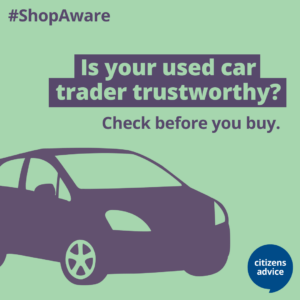As 3.5 million people look to buy a used car Citizens Advice Dorset shares top advice tips to help motorists steer clear of problems

- Problems with used cars are consistently the top complaint made to Citizens Advice’s national Consumer Service
- The charity is offering top advice tips as it reveals 3.5 million people nationally are currently looking to buy a used car
New data from Citizens Advice reveals last year the charity’s national Consumer Service received a complaint about a used car every three minutes.
The majority of these (66%) complaints were about defective goods, while 13% concerned safety issues.
With 3.5 million people across the country currently looking to buy a used car, Citizens Advice Dorset is sharing its top tips with motorists.
This advice also marks the start of the charity’s Consumer Awareness campaign (Monday 20th May – Sunday 2 June). The annual campaign is run by Citizens Advice in collaboration with the Consumer Protection Partnership (CPP), which includes Trading Standards and the Department for Business and Trade.
Daniel Cadisch, Chief Officer, Citizens Advice Central Dorset, said:
“Unexpected car problems can cost us more than just money, they can leave people missing work or unable to drop their kids off at school.
“But all too often we hear from motorists who’ve had used cars mis-sold to them and have had to shell out hard-earned cash to fix surprise issues.
“Many of us across Dorset are feeling the pinch right now, so it’s vital to make sure you’re steering clear of surprise problems and are getting exactly what you paid for when buying a used car. Before making a big purchase like a used car, don’t forget to brake, and make all the right checks before you buy.”
Citizens Advice Dorset offers their top tips to help put a stop to unexpected issues motorists might face when buying a used car:
Check the trader
If you’re buying from a trader (a business that sells cars) you should:
- Look for an established firm with a good reputation. Look for a garage that is a member of the Consumer Codes Approval Scheme, this means you can act through the Code Sponsor if something goes wrong
If you’re buying from an individual seller:
- You’re entitled to expect that the vehicle is roadworthy, unless you and the seller clearly agree it is bought for scrap or for spares and repair
Check the car’s history
You’ll need the seller’s permission to have the vehicle inspected. Make sure to keep a copy of all inspections or checks, either by taking a screenshot or downloading the information.
- Check the car’s details with the DVLA using their free online vehicle checker and check the MOT history on GOV.UK
- Get a private history check. This might cost up to £20, but will give you valuable information about serious problems the car might have. If you’re still not sure – get an independent report. This will give you detailed information about the car’s condition and will cost around £120 to £250
- Inspect the car and take a test drive. You should arrange to view the car in daylight, preferably when it’s dry – it’s harder to spot damage to the car if it’s wet
Paying for a used car
Ask questions if you’re unsure about anything in the small print. Remember you can stop the deal if you feel like you’re being pressured into paying too much or buying additional features. And make sure you get the original (not a photocopy) of the log book (the V5C registration certificate) and the valid MOT test document. Never buy a car without the log book.
The way you pay will affect what rights you might have if something goes wrong:
- If you pay by cash, there are no extra fees or interest but if something goes wrong with the car you won’t have the protection that you have if you buy using a card or on finance.
- If you use a debit card you might have protection from problems from your provider’s chargeback scheme. And if you use a credit card, you’re protected as long as you paid more than £100 and no more than £30,000, even if you only paid for a small part of the cost on a credit card (this is called ‘section 75’ protection).
- If you pay using finance arranged by a trader, you might have extra protection if there’s a problem later, because you can take action against the finance company as well as the trader (or instead of the trader).
You can complain to the Financial Ombudsman Service if you have an unresolved complaint and have paid by debit card, credit card or using finance.
Contact the Citizens Advice consumer helpline on 0808 223 1133 if you need more help – a trained adviser can give you advice over the phone.
For free, confidential advice and support, call the Dorset Adviceline on 0800 144 8848 or visit www.citizensadvicedorset.org.uk for details of your nearest Citizens Advice.
ends
For more information contact: Sian Smith, Comms Officer, tel: 01929 408947, email: [email protected]
About Citizens Advice in Dorset:
Citizens Advice in Dorset provides free, independent, confidential and impartial advice to everyone on their rights and responsibilities to enable them to find a way forward whatever problems they face. We value diversity, promote equality, challenge discrimination wherever we see it and aim to improve the policies and practices that affect people’s lives.
Citizens Advice in Dorset is located across three regions:
- Citizens Advice Bridport & District bridportca.org.uk tel: 0800 144 8848
- Citizens Advice Central Dorset centraldorsetca.org.uk tel: 0800 144 8848
- Citizens Advice East Dorset & Purbeck edpcitizensadvice.org.uk tel: 0800 144 8848
Notes to editors:
- Citizens Advice Consumer Service national figures relate to Used Cars complaints analysed from 01/01/2023 to 31/12/2023.
- Polling methodology: Citizens Advice commissioned Savanta, an independent market research agency, to conduct consumer research using the Savanta Consumer Omnibus survey. The omnibus was conducted over the weekend from the 19th April 2024 to 22nd April 2024. Savanta’s Omnibus was conducted amongst 2291 consumers from across the UK aged 18+. The data has been weighted to ensure results are nationally representative of those age 18+ across the UK and so that accurate data analysis can occur.
- Population methodology calculated by multiplying total-level statistics by the ONS mid-2021 estimate of 51,718,632 adults in Great Britain
